形容词和副词
形容词与副词的常见词义辨析

形容词与副词的常见词义辨析形容词和副词是英语中两类重要的词性。
它们在表达句子中的修饰作用和描述性质上起着关键作用。
然而,由于形容词和副词的词义相似,造成了很多学习者在使用上的困惑。
本文将就形容词和副词的常见词义进行辨析,以便读者更好地理解和运用。
一、常见形容词的词义辨析形容词通常用于修饰名词,用于描述事物的性质、状态、特征等。
以下是常见形容词的词义辨析:1. Good vs. WellGood表示“好的”,用于修饰名词,表示品质好或符合预期。
例如:"He is a good student."(他是一个好学生。
)Well是good的副词形式,表示“好地”或“良好地”。
用于修饰动词,表示做某事好或有技巧地。
例如:"He plays the piano well."(他弹钢琴弹的很好。
)2. Big vs. LargeBig表示“大的”,强调尺寸或可感知的大小。
例如:"She has a big house."(她有一所大房子。
)Large也表示“大的”,但更强调数量或程度上的大。
例如:"They have a large family."(他们家庭人口众多。
)3. Beautiful vs. PrettyBeautiful和pretty都表示“美丽的”,但有细微的差异。
Beautiful更倾向于形容物体或景色的美,而pretty更倾向于形容人的美。
例如:"The sunset is beautiful."(日落很美。
)"She looks very pretty today."(她今天看起来很漂亮。
)4. Old vs. ElderlyOld表示“年老的”,可以用来形容人、物体或事物。
例如:"He is an old man."(他是一个老人。
)Elderly也表示“年老的”,但更倾向于形容年纪较大的人,尤其是中老年人。
形容词和副词(共19张PPT)

04
形容词和副词的特殊用法
形容词的特殊用法
形容词作名词
形容词的比较级和最高级
某些形容词可以作为名词使用,如“ 幸福”、“成功”等,表示一种状态 或结果。
形容词有比较级和最高级的用法,用 于描述程度或数量的差异,如“更快 ”、“最高”等。
形容词修饰名词
形容词可以放在名词前面,用来描述 名词的特征或属性,如“美丽的花朵 ”、“高大的建筑”等。
详细描述
副词用于描述动词、形容词或其他副词的行为方式、程度、时间、频率等,对于准确表达动作或状态的细节至关 重要。通过副词选择题,可以练习副词在不同语境中的用法,如描述动作发生的时间、方式、频率等,判断副词 的正确用法和意义。
综合练习
总结词
提高综合运用形容词和副词的能力
详细描述
综合练习是将形容词和副词结合在一起使用的练习方式,通过设置语境和情境,让学生根据上下文选 择合适的形容词和副词,以增强学生对形容词和副词的理解和应用能力。综合练习可以包括填空、改 错、翻译等形式,让学生在实际运用中提高对形容词和副词的掌握程度。
副词的比较级和最高级
副词的比较级
用于描述动作、状态或方式在两个或更多的人或事物之间的 相对差异。通常在副词后加“-er”或“more + 副词原形” 构成比较级。例如,“faster”和“more beautifully”。
副词的最高级
用于描述动作、状态或方式在三个或更多的人或事物中的最 高或最低程度。通常在副词后加“-est”或“most + 副词原 形”构成最高级。例如,“fastest”和“most beautifully”。
THANK YOU
ห้องสมุดไป่ตู้感谢各位观看
表示动作的程度,如“very”、 “too”、“quite”、“almost”等 。
形容词和副词区别
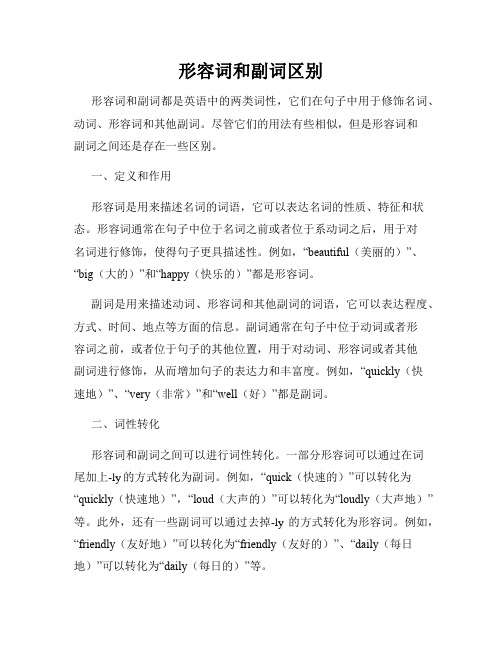
形容词和副词区别形容词和副词都是英语中的两类词性,它们在句子中用于修饰名词、动词、形容词和其他副词。
尽管它们的用法有些相似,但是形容词和副词之间还是存在一些区别。
一、定义和作用形容词是用来描述名词的词语,它可以表达名词的性质、特征和状态。
形容词通常在句子中位于名词之前或者位于系动词之后,用于对名词进行修饰,使得句子更具描述性。
例如,“beautiful(美丽的)”、“big(大的)”和“happy(快乐的)”都是形容词。
副词是用来描述动词、形容词和其他副词的词语,它可以表达程度、方式、时间、地点等方面的信息。
副词通常在句子中位于动词或者形容词之前,或者位于句子的其他位置,用于对动词、形容词或者其他副词进行修饰,从而增加句子的表达力和丰富度。
例如,“quickly(快速地)”、“very(非常)”和“well(好)”都是副词。
二、词性转化形容词和副词之间可以进行词性转化。
一部分形容词可以通过在词尾加上-ly的方式转化为副词。
例如,“quick(快速的)”可以转化为“quickly(快速地)”,“loud(大声的)”可以转化为“loudly(大声地)”等。
此外,还有一些副词可以通过去掉-ly的方式转化为形容词。
例如,“friendly(友好地)”可以转化为“friendly(友好的)”、“daily(每日地)”可以转化为“daily(每日的)”等。
三、修饰范围形容词主要用于修饰名词,它们可以描述名词的特征、品质和属性。
形容词通常回答的问题是“what kind(什么样)”,“which one(哪一个)”或者“how many(几个)”。
例如,“beautiful(美丽的)”修饰“girl (女孩)”,“red(红色的)”修饰“apple(苹果)”。
副词主要用于修饰动词、形容词和其他副词,它们可以描述动作的方式、程度和时间等。
副词通常回答的问题是“how(如何)”,“when (何时)”或者“where(在哪里)”。
英语语法——形容词与副词
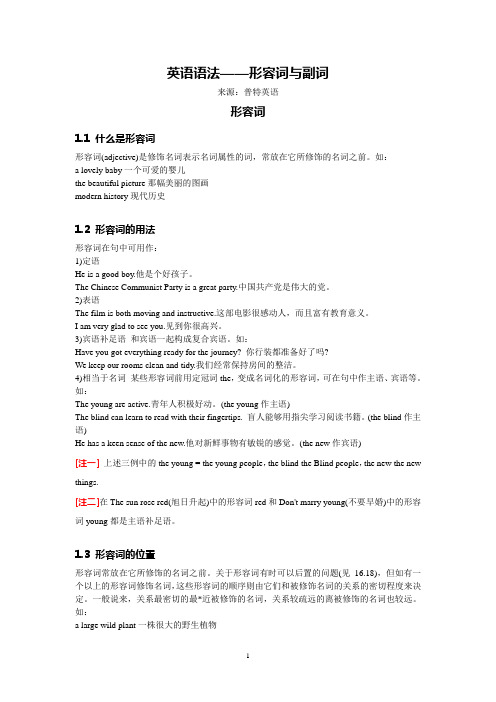
英语语法——形容词与副词来源:普特英语形容词1.1 什么是形容词形容词(adjective)是修饰名词表示名词属性的词,常放在它所修饰的名词之前。
如:a lovely baby一个可爱的婴儿the beautiful picture那幅美丽的图画modern history现代历史1.2 形容词的用法形容词在句中可用作:1)定语He is a good boy.他是个好孩子。
The Chinese Communist Party is a great party.中国共产党是伟大的党。
2)表语The film is both moving and instructive.这部电影很感动人,而且富有教育意义。
I am very glad to see you.见到你很高兴。
3)宾语补足语和宾语一起构成复合宾语。
如:Have you got everything ready for the journey? 你行装都准备好了吗?We keep our rooms clean and tidy.我们经常保持房间的整洁。
4)相当于名词某些形容词前用定冠词the,变成名词化的形容词,可在句中作主语、宾语等。
如:The young are active.青年人积极好动。
(the young作主语)The blind can learn to read with their fingertips. 盲人能够用指尖学习阅读书籍。
(the blind作主语)He has a keen sense of the new.他对新鲜事物有敏锐的感觉。
(the new作宾语)[注一]上述三例中的the young = the young people,the blind the Blind people,the new the new things.[注二]在The sun rose red(旭日升起)中的形容词red和Don't marry young(不要早婚)中的形容词young都是主语补足语。
英语形容词和副词

• He had worked hard all his life .(修饰动词) • He is very diligent.(修饰形容词)
• You can find books on that subject quite easily .(修饰副词)
• Luckily she was in when I called .(修饰句 子)
如: • The desk is clean .
3.作宾语补足语,用在cut, find, keep, leave, make, push, tear等动词之 后。如:
• The news made everyone happy.
• 4.与定冠词一起表示某一类人或物, 如: • The rich and the poor live very different
• Surely you don’t think she’s beautiful? • 你一定觉得她不漂亮吧? • 有些时间副词和频度副词也可放在句首,
• 这类词有yesterday, tomorrow, last night,
• finally, at last, now, soon, once, occasionally, • usually, sometimes等。如:
2.作表语,与系动词连用。只作表语,ill, well, content, unable, sorry, glad, mindful, exempt, bound, bent, afraid, ashamed, asleep, awake, away, aware, alike, alive, alert, averse, agape, astir, aflame, afloat, afire.(还有其他以a开头的词)
语法——形容词与副词

语法——形容词与副词第4讲形容词与副词形容词主要用来描写或修饰名词或代词,表示人或事物的性质、状态、特征、或属性。
副词是用来修饰动词、形容词、其他副词或整个句子,表示时间、地点、方式、程度、动作、频度等。
核心考点01 考查形容词和副词的基本用法当设空处所给的词是名词或动词时,如果所填的词作定语、表语、补语,表示事物的特征,需要考虑用形容词形式;当设空处是形容词时,如果所填的词修饰动词、形容词、其他副词、介词短语、名词短语或整个句子,表示时间、地点、方式、程度、动作、频度等,需要考虑用副词形式。
典例分析(2017全国卷Ⅱ)The Central London Railway was one of the most ________ (success) of these new lines, and was opened in 1900.【解析】句意:伦敦中部铁路是这些线路中最成功的一条,于1900年开通。
根据前面的the most可知, 这里是形容词的最高级, success是名词, 其形容词形式是successful。
【答案】successful状元提醒核心考点02考查形容词和副词的比较等级绝大多数形容词和副词都有三种形式:原级,比较级和最高级,用以表示形容词和副词在程度上的不同。
同级比较用“as + adj. / adv.+as”结构;其否定形式可用“not as / so + adj. / adv. + as”结构。
比较级用于两个人或事物的比较,用“比较级+than+对比成分”构成。
最高级用于两个以上的人和物进行比较,其结构形式为“the+最高级+of / in+比较的范围”。
但是,在很多情况下,比较等级的概念是暗含在上下文的语境中的,因此,考生在作答时一定要特别注意。
典例分析The purpose of new technologies is to make life ________ (easy), not to make it more difficult.【解析】句意:新技术的目的是使生活更容易,而不是使之更困难。
常见的形容词和副词

常见的形容词和副词在我们的日常生活和写作中,形容词和副词是非常常见且有用的词汇。
它们可以丰富我们的表达,使语言更加生动和精准。
本文将介绍一些常见的形容词和副词,并探讨它们的用法和作用。
一、表示人性格和外貌的形容词1. 年轻的:指某人年龄较轻,常用来形容青少年或拥有精力活力的人。
例句:她是一个年轻的教师,充满着热情和创造力。
2. 高大的:形容某人身材较高、较高大。
例句:他是一位高大的篮球运动员,高度让人畏惧。
3. 聪明的:形容某人智力较强。
例句:这个孩子非常聪明,很容易掌握新知识。
4. 可爱的:指某人或某物令人喜爱或具有吸引力。
例句:那只小猫非常可爱,大家都喜欢和它玩耍。
5. 慷慨的:形容某人乐于助人,愿意给予帮助或贡献。
例句:他慷慨地捐赠了一大笔善款用于救助灾区的人们。
二、表示程度和频率的副词1. 非常:表示程度很高,可以用来修饰形容词或动词。
例句:这本书非常有趣,我一下午都沉浸其中。
2. 比较:表示进行比较,程度中等。
例句:他的成绩比较好,但还有进步的空间。
3. 很少:表示频率很低,事情发生的可能性小。
例句:我很少去夜店,更喜欢在家里安静地阅读。
4. 经常:表示频率较高,事情发生的可能性大。
例句:他经常去健身房锻炼身体,保持健康和身材。
5. 快速地:表示某个动作迅速进行,速度很快。
例句:他快速地跑向终点,赢得了比赛的冠军。
三、表示时间和地点的副词1. 现在:表示当前的时间。
例句:我们现在正在开会,过一会儿就开始讨论下一个项目。
2. 早上:表示上午的时间段。
例句:我喜欢早上跑步,清新的空气让我感到宁静和活力。
3. 那里:表示某个地方的位置。
例句:我想去海边度假,那里的风景一定很美。
4. 这里:表示说话人所在的地方。
例句:欢迎大家来参观我们的展览,这里展示了许多珍贵的艺术品。
5. 外面:表示某个地点或房间之外。
例句:外面下着大雨,我们最好待在室内不出门。
四、表示感情和态度的形容词1. 开心的:形容某人感到愉快、快乐。
形容词和副词的知识点归纳
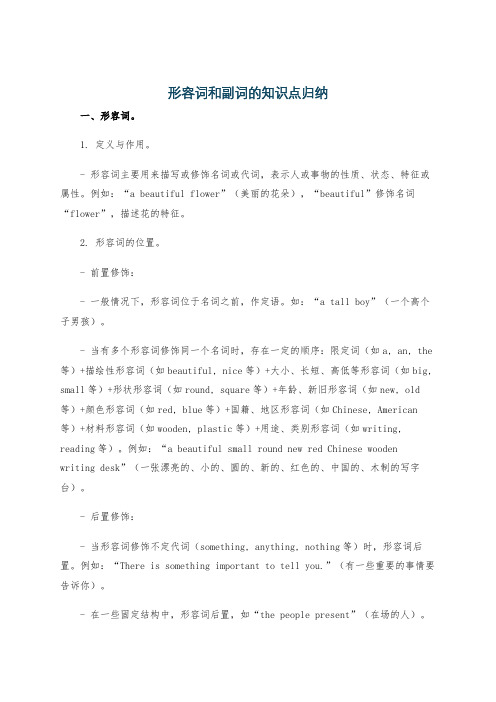
形容词和副词的知识点归纳一、形容词。
1. 定义与作用。
- 形容词主要用来描写或修饰名词或代词,表示人或事物的性质、状态、特征或属性。
例如:“a beautiful flower”(美丽的花朵),“beautiful”修饰名词“flower”,描述花的特征。
2. 形容词的位置。
- 前置修饰:- 一般情况下,形容词位于名词之前,作定语。
如:“a tall boy”(一个高个子男孩)。
- 当有多个形容词修饰同一个名词时,存在一定的顺序:限定词(如a, an, the 等)+描绘性形容词(如beautiful, nice等)+大小、长短、高低等形容词(如big, small等)+形状形容词(如round, square等)+年龄、新旧形容词(如new, old 等)+颜色形容词(如red, blue等)+国籍、地区形容词(如Chinese, American 等)+材料形容词(如wooden, plastic等)+用途、类别形容词(如writing, reading等)。
例如:“a beautiful small round new red Chinese woodenwriting desk”(一张漂亮的、小的、圆的、新的、红色的、中国的、木制的写字台)。
- 后置修饰:- 当形容词修饰不定代词(something, anything, nothing等)时,形容词后置。
例如:“There is something important to tell you.”(有一些重要的事情要告诉你)。
- 在一些固定结构中,形容词后置,如“the people present”(在场的人)。
3. 形容词的比较级和最高级。
- 规则变化:- 一般在词尾加 -er(比较级)和 -est(最高级)。
如:tall - taller - tallest。
- 以不发音的e结尾的单词,加 -r和 -st。
如:nice - nicer - nicest。
形容词与副词的用法

形容词与副词的用法形容词(Adjective)和副词(Adverb)是英语中常见的词性,它们在句子中扮演着重要的角色。
形容词用来修饰名词,描述名词的性质或特征,而副词则用来修饰动词、形容词、副词等,并给出更详细的说明。
本文将从不同的角度探讨这两个词性在句子中的用法。
1. 形容词的用法形容词常用于以下几种情况:(1) 修饰名词形容词可以修饰名词,起到描述名词特征的作用。
例如:- 美丽的花朵在花园中怒放。
- 这个小男孩很聪明。
(2) 构成比较级和最高级形容词可以用来表示比较级和最高级。
在比较级中,我们通常在形容词后加上-er,而在最高级中加上-est,或者在形容词前加上more和most。
例如:- 这本书比那本书更有趣。
- 这是我见过的最美丽的风景。
(3) 作表语形容词可以用作表语,与主语连系动词一起说明主语的特征或状态。
例如:- 这个问题很困难。
- 我很高兴。
2. 副词的用法副词常用于以下几种情况:(1) 修饰动词副词可以修饰动词,表示动作的方式、程度等。
例如:- 他慢慢地走过了街道。
- 她轻轻地打开了门。
(2) 修饰形容词和副词副词也可以修饰形容词和副词,表示程度或者方式。
例如:- 这个女孩非常漂亮。
- 他们跑得很快。
(3) 修饰整个句子副词有时可以修饰整个句子,表示说话人的态度、观点或推测。
例如:- 显然,他是个天才。
- 或许,我们会成功。
总结:形容词和副词在英语句子中的用法多种多样,灵活运用它们可以使句子更加生动、精确。
形容词用来修饰名词,描述名词的性质或特征;而副词则用来修饰动词、形容词、副词等,并给出更详细的说明。
在写作中,我们应该注意正确使用形容词和副词,使句子表达更加准确、丰富。
小学语法---形容词和副词

知识要点:一.形容词、副词的概念形容词:我们把用来修饰名词、代词的词称为形容词。
形容词主要描述人或者事物的性质、特征和状态。
副词:说明事情发生的时间、地点、原因、方式、等含义的词,我们称之为副词。
多用来修饰动词或整个句子。
二.形容词、副词的用法1.形容词一般在句中作定语,放在名词或代词前面,都含有“……的”意思。
如:a nice watch 一只漂亮的手表an empty box 一个空箱子a clever boy 一个聪明的男孩 a beautiful girl 一个美丽的女孩:delicious food 可口的食物an interesting book 一本有趣的书a blue car 一辆蓝色的小汽车an exciting speech 一次令人兴奋的演讲注意:形容词在修饰someone, somebody, something, anyone, anybody, anything, nobody, nothing等不定代词时,需要置于其后。
如:something important (重要的事情) nothing interesting (没有什么有趣的)2.形容词作表语(有些形容词只能作表语,放在系动词之后)These flowers are blue. 这些花是蓝色的。
Bob looks smart today. 今天鲍勃看上去很精神。
有些形容词只能作表语,放在系动词之后, 如:asleep / alike / ill 等%The boy is asleep.Lucy and Lily look alike.Her mother is ill.3.形容词做宾语补足语,放在宾语之后(常用动词有make / paint / keep / find / want / like等后接名词或代词作宾语,再接形容词做宾语补足语,补充说明宾语的状态、特征等。
We must keep our classroom clean.Do you like your tea weak or strongThe boy was beaten black and blue.?4.形容词与表示“长、宽、高、重、老、距离”的词连用时,常放在后面。
形容词和副词
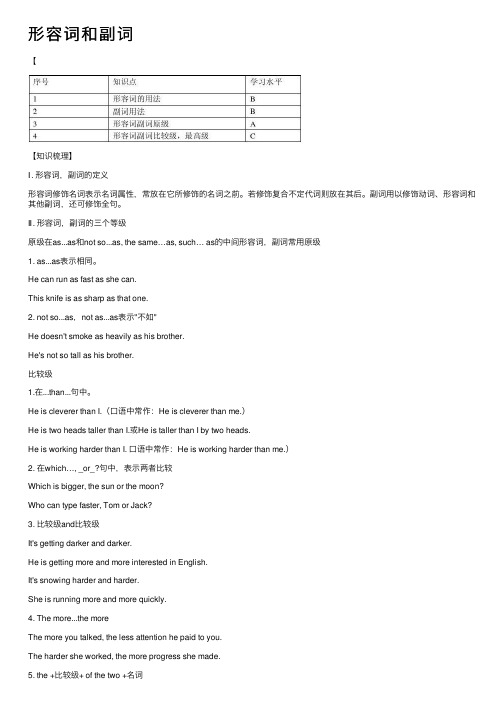
形容词和副词【【知识梳理】Ⅰ. 形容词,副词的定义形容词修饰名词表⽰名词属性,常放在它所修饰的名词之前。
若修饰复合不定代词则放在其后。
副词⽤以修饰动词、形容词和其他副词,还可修饰全句。
Ⅱ. 形容词,副词的三个等级原级在as...as和not so...as, the same…as, such… as的中间形容词,副词常⽤原级1. as...as表⽰相同。
He can run as fast as she can.This knife is as sharp as that one.2. not so...as,not as...as表⽰"不如"He doesn't smoke as heavily as his brother.He's not so tall as his brother.⽐较级1.在...than...句中。
He is cleverer than I.(⼝语中常作:He is cleverer than me.)He is two heads taller than I.或He is taller than I by two heads.He is working harder than I. ⼝语中常作:He is working harder than me.)2. 在which…, _or_?句中,表⽰两者⽐较Which is bigger, the sun or the moon?Who can type faster, Tom or Jack?3. ⽐较级and⽐较级It's getting darker and darker.He is getting more and more interested in English.It's snowing harder and harder.She is running more and more quickly.4. The more...the moreThe more you talked, the less attention he paid to you.The harder she worked, the more progress she made.5. the +⽐较级+ of the two +名词The taller of the two boys is my brother.最⾼级1.表⽰三者或三者以上,通常含有in,of介词短语和定语从句的句⼦Spring is the best season in the north.John is the cleverest of all the boys.This is the best book that I've ever read.He sings (the) best in the class.She jumps highest of the three.2. 在which… , _or_?句中,表⽰三者或三者以上⽐较Which is the biggest, the sun, the moon or the earth?Who can type fastest, Tom, Jack or Mary?3. 形容词最⾼级表⽰“最...之⼀”时,可⽤“one of the+最⾼级+复数名词”Edison was one of the greatest inventors in the world.4. 形容词最⾼级的前⾯有my等形容词性物主代词,名词所有格时不⽤加the.This is my busiest day.The Changjiang River is China's longest river.5. ⽐较级句式表达最⾼级的意思She is taller than any other girl in her class.She is taller than the other girls in her class.She is taller than anyone else in her classShe is taller than any of the other girls in her class.She is taller than the rest of the girls in her class.否定词+⽐较级=最⾼级I have never heard such a better voice.No other river is longer than the Changjiang River in Asia.No doctor is as excellent as Tom’s father.6. ⽐较级,最⾼级前可受much,far,still,no,even,any, rather,a lot, a little, a great deal, by far, a bit等修饰,表⽰超出的程度We have a much better life now.The buildings look far uglier in London than here.The student study even harder than before.I made a lot more mistakes than you (did).Your cake is a little sweeter than mine.It's still hotter today.Have you any more?Oh, sorry, no more.She's no better yet.The train is no longer in sight.You must work much more carefully.You can read even better if you try your best.They will come back a little earlier.Helen came late, but her sister came still later.I am so tired. I can't walk any farther.My brother is rather better today.7.rather ,much, very much, far 修饰⽐较级,最⾼级的区别rather 的后⾯可以接原级,也可以接⽐较级:rather good ,rather tired ,rather formallyThis hat is rather more expensive than that one.much 可以接⽐较级,也可以接最⾼级。
小学英语语法——形容词与副词知识点讲解+练习

形容词和副词一、形容词、副词概述1、形容词定义:形容词(adjective),简称adj,用来修饰名词或代词,表示人或事物的性质、状态和特征。
2、副词定义:副词(adverb),简称adv,用来修饰动词、形容词或副词,表示时间、频率、范围、语气、程度等。
二、形容词、副词考点纵览三、综合练习( ) 1. How beautifully she sings! I have never heard _____ voice.A. a betterB. a bestC. the betterD. the best ( ) 2. She looks very _____ but I can’t remember her name.A. similarB. familiarC. friendlyD. strange ( ) 3. Children all looked _____ at the broken model plane and felt quite _____.A. sad; sadB. sadly; sadlyC. sad; sadlyD. sadly; sad( ) 4. The child dreamed that he had once lived in a _______ house in the forest.A. wooden pretty littleB. little pretty woodenC. pretty little woodenD. wooden little pretty( ) 5. ---Which team is _______ to win the game?---I don’t know, but I’ve found _______ for ours to win.A. probable; it unlikelyB. likely; it possibleC. possible; it possibleD. likely; it possibly( ) 6. With the development of the Internet, _______ communication is done by regular mail.A. lessB. moreC. littleD. few( ) 7. ---If you don’t like the red coat, take the blue one.---OK, but do you have ______ size in blue? This one’s a bit tight for me.A. a bigB. a biggerC. the bigD. the bigger( ) 8. If there were no examinations, we should have ______ at school.A. the happiest timeB. a more happier timeC. much happiest timeD. a much happier time( ) 9. This dress is prettier, but it costs ______ that one.A. twice more thanB. twice as much asC. as much twice asD. twice so much as( ) 10.________students are required to take part in the boat race.A. Ten strong young ChineseB. Ten Chinese strong youngC. Chinese ten young strongD. Young strong ten Chinese( ) 11. Allen had to call a taxi because the box was ____to carry all the way home.A. much too heavyB. too much heavyC. heavy too muchD. too heavy much( ) 12. Our neighbor has ________ours.A. as a big house asB. as big a house asC. the same big house asD. a house the same big as( ) 13. We were in ________when we left that we forgot the airline tickets.A. a rush so anxiousB. a such anxious rushC. so an anxious rushD. such an anxious rush( ) 14. ---I was riding along the street and all of a sudden, a car cut in and knocked me down.---You can never be ________careful in the street.A. muchB. veryC. soD. too( ) 15. ---You don’t look very ________.Are you ill?---No,I’m just a bit tired.A. goodB. wellC. strongD. healthy( ) 16. Four of Robert’s children were at the party,including ________, Luke.A. the eldestB. an oldest oneC. the oldD. an old one( ) 17. Many students signed up for the ________race in the sports meeting to be held next week.A. 800-metre-longB. 800-metres-longC. 800 metre lengthD. 800 metres length( ) 18. It’s always difficult being in a foreign country,________if you don’t speak the language.A. extremelyB. naturallyC. basicallyD. especially( ) 19. In recent years,travel companies have succeeded in selling us the idea that the further we go,__________.A. our holiday will be betterB. our holiday will be the betterC. the better our holiday will beD. the better will our holiday be( ) 20. When he heard a cry for help, he ran out as ________ as he could.A. hardlyB. quicklyC. finallyD. slowly( ) 21. “Our team is _____ to win the match.” “Really? But I don’t think so.”A. easyB. difficultC. possibleD. sure( ) 22. A ______ road goes ______ from one place to another.A. straight; straightB. straightly; straightlyC. straight; straightlyD. straightly; straight( ) 23. “This book is ______ more useful for us students.” “Yes, but it is _______ too difficult.”A. quite; quiteB. much; ratherC. rather; quite D quite; much( ) 24. There was a ______ change in the weather, and the rain came pouring down.A. quickB. slowC. fastD. sudden( ) 25. You can speak ______ in front of him, but you can’t eat ______ in his restaurant.A. freely; freelyB. free; freelyC. freely; freeD. free; free( ) 26. Tom will not be at the picnic, ______ to the family’s disappointment.A. muchB. moreC. too muchD. much more( ) 27. --- I have seen so little of Mike ______. Is he away on business?--- Oh, no. He just leaves for his office early and comes back very ______.A. later; latelyB. later; laterC. lately; lateD. late; lately( ) 28. From his ______ voice on the phone I know everything is well under way.A. satisfactoryB. satisfyingC. satisfiedD. satisfaction( ) 29. In ______ Chinese culture, marriage decisions were often made by parents for their children.A. traditionalB. historicC. peacefulD. civil( ) 30. The houses in the village are ______ built of wood and hay.A. mostB. almostC. nearlyD. mostly( ) 31. --- What do people wear when they go to the theatre?--- Well, it isn’t very ______. People can wear anything they like.A. normalB. certainC. modernD. simple( ) 32. Mary’s biology is ______ than ______ in the class.A. a lot of better; anyone else’sB. far better; anyone’s else’sC. much better; anyone elseD. a lot better; anyone else’s( ) 33. We decided not to climb the mountains because it was raining ____.A. badlyB. hardlyC. stronglyD. heavily( ) 34. Paris is one of _____ cities in the world.A. more beautifullyB. more beautifulC. the most beautifullyD. the most beautiful ( ) 35. Are you going to leave______?A. the open windowsB. the windows openingC. the windows openD. the windows opened( ) 36. Bob never does his homework _____ Mary, so he makes lots of mistakes.A. so careful asB. as carefully asC. carefully asD. as careful as.( ) 37. My sister is good at sports. She can jump ____ than me.A. highestB. very highC. too highD. much higher ( ) 38. When spring comes, the trees get ____.A. green and greenB. green and greenerC. greener and greenD. greener and greener( ) 39.He works very ___________.He _____________has a rest on Sundays.A. hard; hardlyB. hardly; hardC. hard; hardD. hardly; hardly( ) 40.He learns Russian_____________.A. goodB. niceC. wellD. fine( ) 41.The boy didn’t run______________ to catch the bus.A. fast enoughB. enough fastC. quick enoughD. enough quickly ( ) 42.Eating _____________ is bad for our health.A. much tooB. too muchC. too moreD. too many( ) 43.Have you ever seen ______________ big panda before?A. a suchB. such aC. so aD. as( ) 44.He looks very _____________ today.A. worriedB. worryC. worryingD. to worry( ) 45.Listen to me. I have _____________ to tell you.A. important somethingB. important anythingC. something importantD. anything important( ) 46. ---How ___ can you finish the drawing?--- In ten minutes.A. longB. often.C. soonD. rapid( ) 47. This book is _____ worth seeing again.A. veryB. quiteC. wellD. much( ) 48. My _____ brother is three years ____ than I .A. old; olderB. elder; olderC. older; elderD. old; elder( ) 49. We felt ___ after we watched the ___ football match.A. exciting; excitedB. excited; excitingC. excited; excitedD. exciting; exciting( ) 50. The old man lived ____ in the house, but he didn’t feel___.A. lonely; lonelyB. alone; lonelyC. alone; aloneD. lonely; alone小学英语语法——形容词与副词知识点讲解+练习参考答案1. A2.B3.D4.C5.B6.A7.B8.D9.B 10.A 11. A 12.B 13.D 14.D 15.B 16.A 17.A 18.D 19.C 20.B 21. D 22.A 23.B 24.D 25.C 26.A 27.C 28.C 29.A 30.D 31. B 32.D 33.D 34.D 35.C 36.B 37.D 38.D 39.A 40.C 41. A 42.B 43.B 44.A 45.C 46.C 47.C 48.B 49.B 50.B11。
形容词副词用法总结
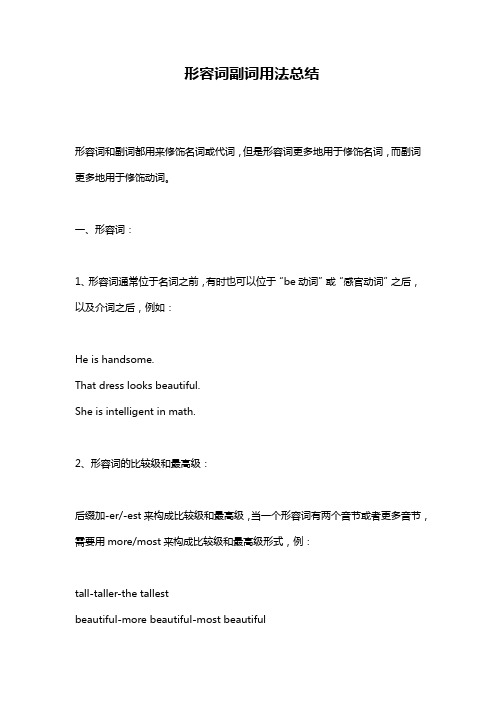
形容词副词用法总结形容词和副词都用来修饰名词或代词,但是形容词更多地用于修饰名词,而副词更多地用于修饰动词。
一、形容词:1、形容词通常位于名词之前,有时也可以位于“be动词”或“感官动词”之后,以及介词之后,例如:He is handsome.That dress looks beautiful.She is intelligent in math.2、形容词的比较级和最高级:后缀加-er/-est来构成比较级和最高级,当一个形容词有两个音节或者更多音节,需要用more/most来构成比较级和最高级形式,例:tall-taller-the tallestbeautiful-more beautiful-most beautiful3、形容词的反义词:具有反义关系的形容词可以直接用前缀un-来表示反义,例:happy-(un)-happy4、形容词的最高级的格式:形容词最高级的表达形式是“the +原级+ of/in +名词”,当名词前面提到的只有2个,可以不用of,例如:He is the tallest boy of the three.She is the prettiest girl in the class.二、副词:1、副词通常用来修饰整句,最常见的形式有“副词+动词”,例:She speaks quickly.2、副词的比较级和最高级:副词比较级和最高级一般通过-er和-est来构成,但也有些特殊情况,例如“good-better-best”;当副词有三个或者更多音节时,需要用more/most来构成比较级和最高级形式,例:carefully-more carefully-most carefully3、副词的最高级的格式:副词最高级的表达形式一般是“the +副词+ of/in +名词”,当名词前面提到的只有2个,可以不用of,例如:He runs the fastest of all.She dances the most beautifully in the party.。
英语形容词和副词
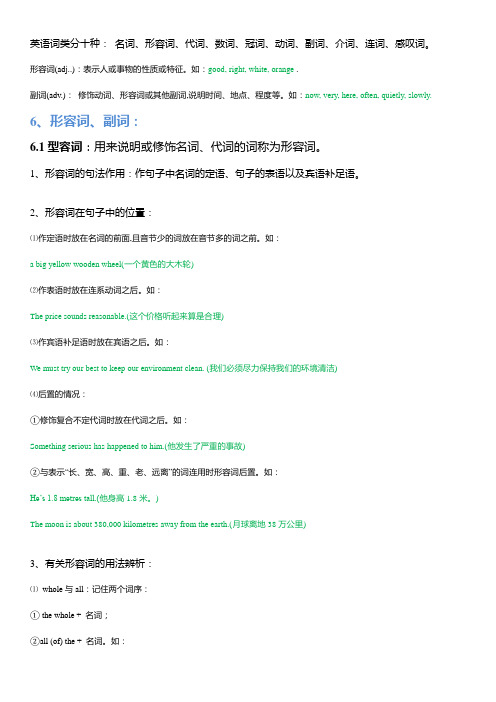
英语词类分十种:名词、形容词、代词、数词、冠词、动词、副词、介词、连词、感叹词。
形容词(adj..):表示人或事物的性质或特征。
如:good, right, white, orange .副词(adv.):修饰动词、形容词或其他副词,说明时间、地点、程度等。
如:now, very, here, often, quietly, slowly.6、形容词、副词:6.1型容词:用来说明或修饰名词、代词的词称为形容词。
1、形容词的句法作用:作句子中名词的定语、句子的表语以及宾语补足语。
2、形容词在句子中的位置:⑴作定语时放在名词的前面,且音节少的词放在音节多的词之前。
如:a big yellow wooden wheel(一个黄色的大木轮)⑵作表语时放在连系动词之后。
如:The price sounds reasonable.(这个价格听起来算是合理)⑶作宾语补足语时放在宾语之后。
如:We must try our best to keep our environment clean. (我们必须尽力保持我们的环境清洁)⑷后置的情况:①修饰复合不定代词时放在代词之后。
如:Something serious has happened to him.(他发生了严重的事故)②与表示―长、宽、高、重、老、远离‖的词连用时形容词后置。
如:He‘s 1.8 metres tall.(他身高1.8米。
)The moon is about 380,000 kilometres away from the earth.(月球离地38万公里)3、有关形容词的用法辨析:⑴whole与all:记住两个词序:① the whole + 名词;②all (of) the + 名词。
如:He was busy the whole morning.(整个早晨他都很忙)He can remember all the words he learns.(他能记住学过的所有单词)⑵tall与high, short与low:指人的个子时用tall与short;指其他事物时一般用high与low。
英语语法——形容词与副词

1)本身就是副词,如 now 现在,there 那里,rather 颇。 2)由形容词加词尾-1y 变来,如 firmly 坚决地,happi1y 幸福地。 3)与形容词同形 early adj. 早的 early adv. 早 high adj. 高的 high adv. 高高地 long adj. 长的,长久的 long adv. 长久地
[注一] 汉语可以说"昆明的气候比兰州好"。英语必须加 that,译为:
The climate of Kunming is better than that of Lanzhou.
[注二]英语比较级常译作"较…"、"…一些"等,但不等于汉语的"更…"。汉语的"更…"须用
"still"或"even"来表示如: This book is even more difficult than that one.这本书比那本书更难。
[注三] 有些形容词一般没有比较等级。如:
right, wrong,woolen,wooden. 不规则变化 原级 比较级 最高级 good 好 we11 好,健康的 better best bad 坏,差 worse worst many 多 more most much 多 little 小,少 1ess 1east far 远 farther,further farthest,furthest 形容词前如加 1ess 和 least,则表示"较不"和"最不"。如: interesting 有趣 difficult 难 less interesting 较无趣 less difficult 较不难 least interesting 最无趣 leas difficult 最不难
英语语法:形容词和副词

4. 形容词和副词4.1 形容词及其用法形容词修饰名词,说明事物或人的性质或特征。
通常,可将形容词分成性质形容词和叙述形容词两类,其位置不一定都放在名词前面。
1) 直接说明事物的性质或特征的形容词是性质形容词,它有级的变化,可以用程度副词修饰,在句中可作定语、表语和补语。
例如:hot 热的。
2) 叙述形容词只能作表语,所以又称为表语形容词。
这类形容词没有级的变化,也不可用程度副词修饰。
大多数以a开头的形容词都属于这一类。
例如:afraid 害怕的。
(错)He is an ill man.(对)The man is ill.(错)She is an afraid girl.(对)The girl is afraid.这类词还有:well,unwell,ill,faint,afraid,alike,alive,alone,asleep,awake 等。
3)形容词作定语修饰名词时,要放在名词的前边。
但是如果形容词修饰以-thing为字尾的词语时,要放在这些词之后,例如:something nice4.2 以-ly结尾的形容词1)大部分形容词加-ly可构成副词。
但friendly,deadly,lovely,lonely,likely,lively,ugly,brotherly,仍为形容词。
改错:(错)She sang lovely.(错)He spoke to me very friendly.(对)Her singing was lovely.(对)He spoke to me in a very friendly way.2)有些以-ly 结尾既为形容词,也为副词。
daily,weekly,monthly,yearly,earlyThe Times is a daily paper.The Times is published daily.4.3 用形容词表示类别和整体1)某些形容词加上定冠词可以泛指一类人,与谓语动词的复数连接。
【知识点】形容词和副词
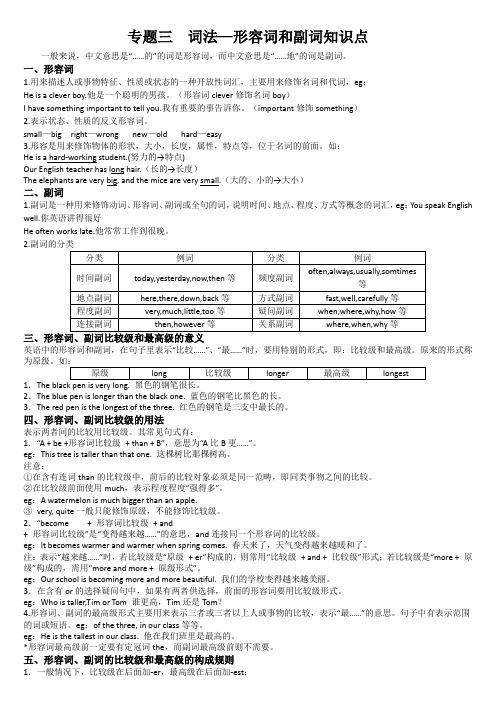
专题三词法—形容词和副词知识点一般来说,中文意思是“……的”的词是形容词,而中文意思是“……地”的词是副词。
一、形容词1.用来描述人或事物特征、性质或状态的一种开放性词汇,主要用来修饰名词和代词,eg:He is a clever boy.他是一个聪明的男孩。
(形容词clever修饰名词boy)I have something important to tell you.我有重要的事告诉你。
(important修饰something)2.表示状态、性质的反义形容词。
small—big right—wrong new—old hard—easy3.形容是用来修饰物体的形状,大小,长度,属性,特点等,位于名词的前面。
如:He is a hard-working student.(努力的→特点)Our English teacher has long hair.(长的→长度)The elephants are very big, and the mice are very small.(大的、小的→大小)二、副词1.副词是一种用来修饰动词、形容词、副词或全句的词,说明时间、地点、程度、方式等概念的词汇,eg:You speak English well.你英语讲得很好He often works late.他常常工作到很晚。
2.英语中的形容词和副词,在句子里表示“比较……”、“最……”时,要用特别的形式,即:比较级和最高级。
原来的形式称1.2.The blue pen is longer than the black one. 蓝色的钢笔比黑色的长。
3.The red pen is the longest of the three. 红色的钢笔是三支中最长的。
四、形容词、副词比较级的用法表示两者间的比较用比较级。
其常见句式有:1.“A + be +形容词比较级+ than + B”,意思为“A比B更……”。
形容词和副词
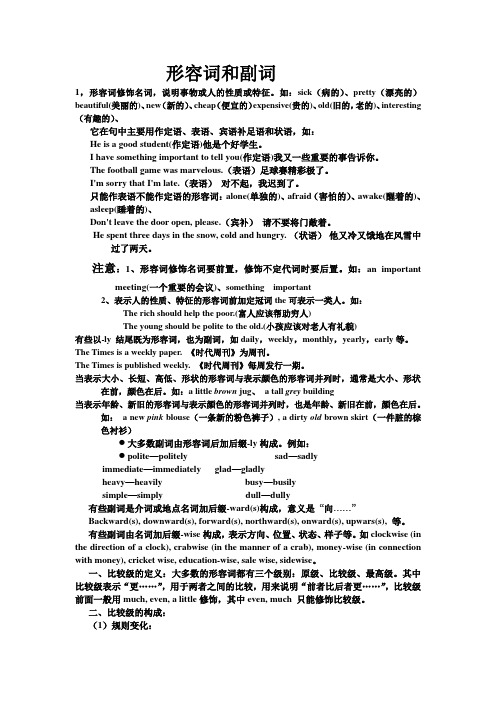
形容词和副词1,形容词修饰名词,说明事物或人的性质或特征。
如:sick(病的)、pretty(漂亮的)beautiful(美丽的)、new(新的)、cheap(便宜的)expensive(贵的)、old(旧的,老的)、interesting (有趣的)、它在句中主要用作定语、表语、宾语补足语和状语,如:He is a good student(作定语)他是个好学生。
I have something important to tell you(作定语)我又一些重要的事告诉你。
The football game was marvelous.(表语)足球赛精彩极了。
I'm sorry that I'm late.(表语)对不起,我迟到了。
只能作表语不能作定语的形容词:alone(单独的)、afraid(害怕的)、awake(醒着的)、asleep(睡着的)、Don't leave the door open, please.(宾补)请不要将门敞着。
He spent three days in the snow, cold and hungry. (状语)他又冷又饿地在风雪中过了两天。
注意:1、形容词修饰名词要前置,修饰不定代词时要后置。
如:an importantmeeting(一个重要的会议)、something important2、表示人的性质、特征的形容词前加定冠词the可表示一类人。
如:The rich should help the poor.(富人应该帮助穷人)The young should be polite to the old.(小孩应该对老人有礼貌)有些以-ly 结尾既为形容词,也为副词,如daily,weekly,monthly,yearly,early等。
The Times is a weekly paper. 《时代周刊》为周刊。
The Times is published weekly. 《时代周刊》每周发行一期。
- 1、下载文档前请自行甄别文档内容的完整性,平台不提供额外的编辑、内容补充、找答案等附加服务。
- 2、"仅部分预览"的文档,不可在线预览部分如存在完整性等问题,可反馈申请退款(可完整预览的文档不适用该条件!)。
- 3、如文档侵犯您的权益,请联系客服反馈,我们会尽快为您处理(人工客服工作时间:9:00-18:30)。
形容词和副词:重难点精讲考点1.用法:形修名,副修动。
考点2.形容词与副词的变化规律及用法区别形容词用于修饰名词和代词,表示被修饰事物的性质和特征。
副词用于修饰动词、形容词、副词。
形容词、副词的变化是有规律的:◆直接由形容词加-ly构成。
如:quiet→quietly slow→slowly bad→badly usual→usually sudden→suddenly careful→carefully◆以辅音字母加“le”的词,去e加-y。
如:simple→simply gentle→gently terrible→terribly◆以辅音字母加“y”结尾的词,变y为i,再加-ly。
如:easy→easily happy→happily busy→busily heavy→heavily◆其他变化形式:full→fully true→truly◆不带ly的常用副词有:well, fast, hard, high, straight等。
注意:①hardly不是hard的副词。
hardly是“几乎不”的意思;hard作形容词是“硬的,难的”的意思,作副词是“努力地”的意思。
②daily, lovely, friendly, lonely, ugly, likely等是形容词,不是副词。
【现学现用】1. The price of the sweater is very ____, I can’t afford it.A.expensiveB.cheapC.high2. Are you ____with your sister? Yes, she is always late for school.A. satisfiedB. angryC. strict3. You are relaxing yourself here?Y es. It feels____to walk slowly along the river.A.fantasticB.boringC. strange4. My dog is very____. It is safe to touch him if you want to.A. smartB. braveC. friendly5. The fans were ____ to know the death of their favorite singing star Whitney Houston.A.gladB.surprisedC.excited6. In order to balance study and entertainment, every student is supposed to plan the time ____.A.simplyB.carefullyC.pleasantly7. Helen was so excited at the news that she could ____say a word.A.everB.almostC.hardly8. It’s raining ____now. Y ou’d better take an umbrella with you.A.heavyB.heavilyC. strong9. Why did you vote for Maggie?Because she is very____. She always shares things with others.A. practicalB. activeC. generous10. Mom, I was the first to reach the top of the mountain.Good job, Charlie. I’m____of you.A. tiredB. proudC. sure11. The Internet is really____to us. We can download a lot of things from it.A. usefulB. difficultC. different12. It is our hope that we can live in a ____world and say goodbye to wars forever.A. peacefulB. familiarC. natural13. No matter what happens, the fact that Huangyan Island belongs to Chinawill ____change. A.ever B.never C.still14. The box is too heavy to carry. What’s in it?Oh, it ____books. A. is filled with B. is used for C. is aimed at【易混点1】There is a smile on Miss Gao’s face. She must be ____with Sam’s work.I think so. No one did as as him in our class.A. angry; wellB. pleasing; goodC. pleased; well考点3.形容词和副词的比较等级1. 形容词、副词比较级的规则变化比较级的变化口诀比较级要变化,一般词尾加-er。
最高级加-est,前面加the莫忘记。
词尾若有哑音e,直接加-r或-st。
一辅重读闭音节,辅音字母要双写。
辅音字母加-y,要把y改为i。
若是多音节,只把more,most前面写2. 形容词、副词比较级的不规则变化3. 多音节、双音节及比较级前的修饰词比较级前可用much, still, a lot, far, even, twice, a little等词修饰,但不可用many, too, so等词修饰。
这些词常用来表示比较级的程度。
如:We have a much better life now.【现学现用】15. Lucy does homework ____ than Tim.A. carefullyB.more carefulC.more carefully16. -Now people’s life is ____ than before.Yes. Many people have their own cars.A. much betterB.less betterC.more better17. The more____ people drive, the ____ traffic accidents there will be.A.careful; lessB.carefully; fewerC.careful; fewer18. This T-shirt is not large enough. Please show me a ____one.rgergerC. largest19. We lost the match because they had___players. They had eleven and we had only nine!A.moreB.youngerC.fewer20. It’s good news that Harbin is developing ____ these years than ever before.A.quicklyB. less quicklyC. more quickly21. ____scientific attitude is needed in developing our city.I agree with you. In this way, we can make ____mistakes.A. Fewer; lessB. Less; moreC. More; fewer【易混点2】In the piano contest, my brother didn’t play well and I did____.A. wellB.betterC. worse考点4. 形容词的特殊句型1. 形容词原级的特殊句型(1)as...as句型◆“甲+be+as+原级+as+乙”表示“甲乙两者程度相同”。
◆“甲+be+not+as/so+原级+as+乙”表示“甲不如乙……”。
如:2. 比较级的特殊句型◆“甲+be+形容词比较级+than+乙”,表示“甲比乙……”。
如:◆“the+比较级...,the+比较级...”表示“越……,就越……”。
如:◆“比较级+and+比较级”表示“越来越……”。
如:◆数量词+比较级,表示“大……,长……”。
如:3. 最高级的特殊句型◆“主语+be+one of the+最高级+名词复数+in/of短语”表示“……是最……之一”。
如:◆主语+be+the+序数词+最高级+单数名词+范围,表示“……是……的第几……”。
如:【现学现用】22. The more you smile, the ____ you will feel.A. happyB. happierC. happily23. I think computer science is____ foreign languages.A. so difficult asB. as difficult asC. much difficult than24. When winter comes, days get ____.A. long and longB. shorter and shorterC. longer and longer25. Pudong International Airport is one of ____ airports in the world.A.the biggestB.biggerC. biggest。
